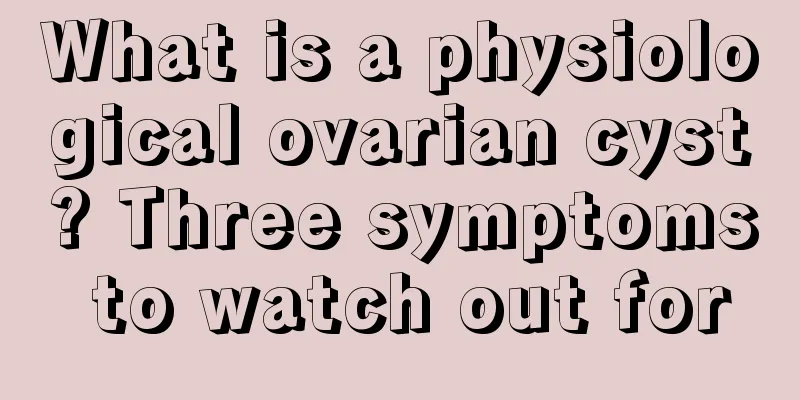What is a physiological ovarian cyst? Three symptoms to watch out for

|
Ovarian cyst is a common disease of the female reproductive system, which is divided into physiological ovarian cyst and pathological ovarian cyst. Generally, physiological ovarian cyst can disappear on its own, but it should also be taken seriously and treated in time. So what exactly is ovarian cyst? What are the symptoms? What is a physiological ovarian cyst? Physiological ovarian cysts usually refer to non-tumor ovarian cysts among ovarian cysts, also known as non-neoplastic ovarian cysts. Most of them are functional cysts of the ovaries, including follicular cysts, corpus luteum cysts, lutein cysts, inflammatory ovarian cysts, polycystic ovaries, and endometriosis cysts (ie, ovarian chocolate cysts). Non-neoplastic cysts are a relatively common type of ovarian cyst, which generally occur in women of childbearing age during the ovulation period. Patients with physiological ovarian cysts do not need to worry too much, because physiological ovarian cysts will gradually subside or shrink over time and will not affect women's daily life. Symptoms of physiological ovarian cysts 1. Suddenly one day I found that my clothes became tighter. Many patients with physiological ovarian cysts have this feeling, that their waist circumference has become thicker, and it is very obvious when they wear clothes, and they feel that the clothes or belts have become tight and small. You can also press your abdomen before you get up in the morning, and you will find that there is a swelling in your abdomen, and you will feel bloated and uncomfortable. 2. Sudden stomach pain. Women with ovarian cysts may experience abdominal pain, especially if the cyst is twisted or occasionally due to cyst rupture, bleeding or infection. In addition, malignant cysts often cause abdominal pain and leg pain, and the pain often causes patients to seek emergency treatment. 3. Irregular menstruation. If there is a cyst on one or both ovaries, it will generally cause menstrual disorders and irregular menstruation because it will not damage all normal ovarian tissues. Patients with menstrual disorders are often accompanied by physiological ovarian cysts, such as follicular cysts. How to judge physiological ovarian cyst If the diameter of an ovarian cyst is less than 5 cm, it should be considered a physiological cyst, such as a corpus luteum cyst or a follicular cyst. Most of them disappear on their own. So regular check-ups are sufficient. If the cyst diameter is larger than 5CM, it should be considered as an ovarian tumor. Therefore, your situation does not require any treatment for the time being. It is recommended that you regularly check the growth and decline of the cyst, generally with an ultrasound check every 3-6 months. |
<<: What to eat for breast hyperplasia? Five types of food have good effects
>>: [Health Care] Detailed explanation of the efficacy and method of stewing papaya with milk
Recommend
What kind of nutritional benefits can pregnant women get from eating peanuts?
Generally, pregnant women are well taken care of ...
Pregnant women with bleeding gums should eat more of these
Bleeding gums refers to the symptom of a small am...
Can I have sex with vaginal candidal infection?
Gynecological diseases have a great impact on the...
What are the benefits of making sweet soup with pears and red dates? How to make cooked pear cake soft, sweet and delicious?
Pears are juicy, sweet and sour, and rich in nutr...
Is it more painful to do a liposuction or a biopsy?
Cervical erosion surgery, also known as ultra-hig...
Are skin care products containing preservatives not good products?
Not really There are some common misconceptions a...
How to prevent gynecological inflammation to be a healthy woman?
Female friends should pay attention to preventing...
CounterPoint: Chinese brands accounted for 65% of the Colombian smartphone market in Q2 2021
Chinese brands currently dominate the Colombian s...
Causes of ovulation bleeding in teenage girls
There are many reasons why teenage girls may expe...
Pig intestines are delicious! Can you eat more?
Pig intestines are a favorite of many people. Spi...
Four-dimensional color Doppler ultrasound left ventricle bright spot
People's heart function is originally a very ...
What is the best way to treat trichomoniasis?
Trichomonas infection is a common gynecological i...
What should I do if my breasts swell and hurt after an abortion? Take good care of your breasts
Some women will experience breast pain after an a...
Why did I still get pregnant after taking birth control pills?
In daily life, female friends may have unprotecte...
What is endometritis infertility?
Nowadays, many married female friends will experi...









